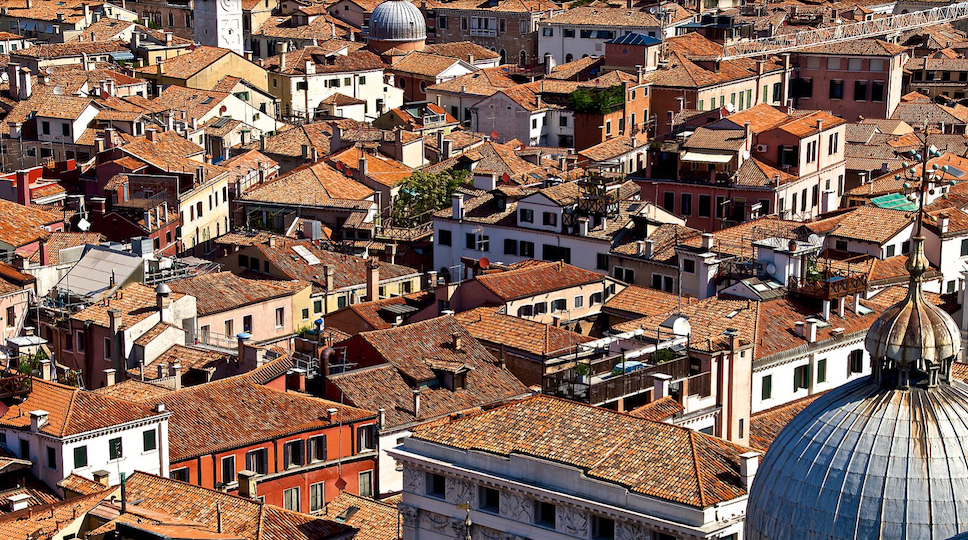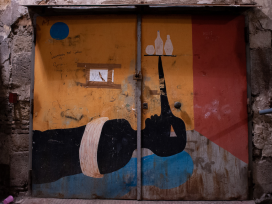Remi Wacogne from Italian organization OCIO in conversation with Christoph Laimer and Elke Rauth from dérive.
dérive: You are a member of the civil society alliance OCIO. What is OCIO about?
Remi Wacogne: OCIO is an acronym for Osservatorio CIvicO sulla casa e la residenza – Venezia, which translates to Civic Observatory on housing and living (in Venice). We’re not an association but a group of people of all ages and with different expertise engaging in housing issues. Some are researchers, some are civil servants, some from the private sector, and so on.
OCIO in Venetian means ‘the eye’. We look deeply into housing issues in Venice. We focus on the island of Venice, including Giudecca, but excluding Murano, Burano and the mainland – not because we’re not interested in those realities, but as a voluntary group we have had to narrow our focus.
dérive: Housing is a wide field. What are the specific topics you are focusing on?
Remi Wagocne: Our work covers three dimensions of housing that according to us should be considered as a whole. The first one is public housing, meaning publicly owned and managed housing. In Italian it’s called Edilizia residenziale pubblica or Case popolari. Public housing in Venice amounts to a rather significant number for Italy, because Venice had ambitious housing policies for more than a century. In this field we deal with the activities of the municipality and the regional agency A.T.E.R. (Azienda Territoriale per l’Edilizia Residenziale della Provincia di Venezia) that are in charge of roughly an equal share of the public housing stock.
The second dimension is social housing, which we find rather problematic by definition. In Italy social housing doesn’t have to be public. Usually, it involves an agreement between a public actor and private actors, sometimes even the third sector, to make sure that social housing is available. Social housing’s target group has a slightly higher income compared to those in public housing. Still, social housing deals with people that can’t afford market prices like families or young couples.
The third dimension are short-term rentals like Airbnbs, which have become a great problem in Venice. We publish reports on those various aspects and sometimes our research is published in other contexts by magazines or other websites.
dérive: What is the current distribution of public housing, social housing and the privately financed housing sector in Venice?
Remi Wagocne: As highlighted by Laura Fregolent, public housing accounts for about eight percent of the total housing stock in Venice, about a third if you consider only rent and a still higher proportion in the historic city. Social housing, meaning forms like affordable housing, is almost non-existent.
Several projects have been announced by successive administrations up until now. Some of them have been promised but have never been initiated. Others have been initiated but not finished due to bankruptcies in construction after 2011–2012’s economic crisis.
Only one of them has actually been achieved. It’s called Opera Pia Coletti in Cannaregio. 71 apartments were assigned through a call that prioritized young couples and people working in culture or research. But some tenants haven’t been able to afford the housing costs, as the co-ownership-fees are high. Several of them actually had to resign or were unable to pay the rent. And that’s the only affordable housing reality in Venice at the moment.
Social housing is too marginal to have an effect on market prices and the management of public housing could be managed much better. The number of empty flats is increasing year on year. There are reasons behind this, one of which being the amount of elderly tenants: there is a high turnover and apartments need to be renovated before being re-assigned. The resources for public housing, not only in Venice but all over Italy, have been dwindling. There’s been a sheer disinvestment in public housing over the last three decades, as Italian policy supports private home ownership, rather than public housing. There’s no ambitious management for public housing, although the number of people who would be entitled to have a public flat because of their low income is high.
So, when we talk about housing, we are facing a complete lack of affordable housing. The few that exist are only available at almost market prices. Public housing is dwindling year on year and it’s managed in a way that the demand can’t be matched. And the housing market is occupied by tourist rentals. If you’re looking to permanently rent a flat in Venice, there are basically no offers and therefore no chance that you find one, unless you are very lucky and know somebody who knows somebody who is leaving and renting out their flat – that’s about the only way you can make it.
And, if you’re lucky enough to find one, you face expensive rents and need a very good wage to afford it. Venice has the highest rents in Italy, together with Milan, Florence and Rome.

Roofs of Venice. Image by Max Torben Heinrich, via Wikimedia Commons.
dérive: The municipality had been monitoring the housing market until 2012 and then stopped. Why is that?
Remi Wagocne: As mentioned before, the municipality of Venice has had a rather significant ratio of public housing and social services due to ambitious policies in the past. From 1967, the municipality ran a research study centre named COSES that delivered data on topics valuable for public policy making, including tourism but also housing. In the 1990’s, Osservatorio Casa (Observatory on Housing) was set up and collaborated with COSES. They published a survey on why people were moving out of Venice in 2007, naming housing prices and availability as the main cause. This meant pressure for property policies. Both organizations were suspended between 2012 and 2014, mostly due to spending review. 2014 was also the year Mayor Orsoni had to resign because of the MOSE corruption scandal.
This was one of the reasons for setting up OCIO, after a series of public meetings that were hosted by the District Council of Venice, Murano and Burano. A group of people that came from other associations and civic groups in Venice started organizing public meetings on housing topics. At some point it became clear that there was a need to structure the discourse and to go further into analysis, to publish insights and make the information available to people. That’s basically how OCIO was born, a group of people all volunteering in their spare time. It’s more or less still the same, although by now we sometimes do have some contributions for our activities.
dérive: Visiting Venice one gets the impression that the whole city is a huge Airbnb hub. How serious are the problems?
Remi Wagocne: Short-term rentals are a pressing dimension of our work. These tourist rentals have become a reality in Venice that almost feels like a caricature looking at the number of tourist beds – adding up bed and breakfasts, hotels and Airbnbs.
In the summer of 2023 tourist beds exceeded the number of registered residents for the first time: 49,693 against 49,304. This figure to us is very important and was echoed in international media. It’s also one of the reasons why we focus our work on the historic city of Venice. The reality there is slightly different from other areas of the municipality, even though a similar trend is clearly perceivable on the islands and the mainland.
Ten years ago, an association called Venessia.com set up a residents counter in a pharmacy near Rialto Bridge. In 2023 OCIO set up one more counter at the Marco Polo bookshop in Campo Santa Margherita, since we expected the number of tourist beds to soon exceed the number of residents. Putting up counters like that is a way to make trends that have a major impact on all aspects of living in Venice visible.
If you are walking around Venice today, you can see these small LT / Locazione Turistica plates literally everywhere. Since 2019 it’s legally compulsory (in Veneto) to expose the code assigned to each tourist accommodation on the facade, and nowadays you can’t come across a building without a plate – and I’m not exaggerating. Many of these flats are left empty, for Venice’s depopulation has been rather steady from over 170,000 inhabitants in the early 1950s to less than 50,000 now. But how is this trend to be reversed if everything is rented out to tourists?
dérive: Are there any regulations to prevent the transformation of housing into touristic infrastructure?
Remi Wagocne: The current administration has passed a local regulation that – at least in theory – should prevent the building of new hotels as well as the conversion of existing buildings into hotels. But the administration itself has continuously issued permits for new hotels, making so many exceptions to its own regulation that it doesn’t seem to work as a regulation at all.
Dozens of hotels have been realized over the past few years. Still, the main problem is short-term rentals, for example Airbnbs that have been booming since 2016 due to non-existing regulations. To turn an empty flat into a short term Airbnb rental doesn’t need a permit, the owner just needs to declare it a locazione turistica. The other regulation is taxation, with a standard rate of 21% of the rental income, but in the beginning of 2024 it was raised to 26% if you rent out a second flat. As a citizen you can freely declare that sort of activity up to two flats before it becomes a business with a VAT number and all. The question of control is key, and if you consider the number of Airbnb beds it becomes clear that the administration isn’t able to sustain control.
dérive: Who are the owners of these short term rental apartments?
Remi Wagocne: The question of ownership is rather tricky to explore due to the lack of sufficient data. One small action that the current administration has taken was setting up the localized platform called GeoIDS where registered tourist flats are mapped. But some information is up to the landlord to publish or not. So there might be just a name, which doesn’t deliver any insight.
Considering that some flats might not be registered – and clearly many are not – the mapping shows that Venice is literally covered with tourist flats, with only a few exceptions like Sant’Elena, where a lot of public housing still exists. GeoIDS can also be used by residents to announce rental activities that are abusive. But again, there’s no serious control programme from the municipality and you can’t expect residents to report all abuses. In any case abusive rentals are not the main issue: it’s overtourism.
dérive: Are you connected to other housing initiatives in Italy and Europe?
Remi Wagocne: Yes, OCIO is also part of a platform of civic movements at the national level called Alta Tensione Abitativa (High Pressure on Housing). The aim is to promote a national act to regulate short-term rentals. The idea is to form a legal instrument for municipalities reported to have a housing issue. In our proposal, the municipalities would have the possibility to issue a regulation on short-term rentals in order to limit the proportion of rentals with respect to the residents. The proposal has been hitting the news after an event organized here in Venice in March 2023. We invited experts from other European cities like Amsterdam, Barcelona, Paris and Berlin that have been trying to regulate the phenomenon. Afterwards, several mayors from Italian cities stated in the news that such a law is needed. We’re trying to push our proposal and we’ve intensely discussed and elaborated the text for a law together with other cities. But under the current government it’s not as easy as you imagine.
dérive: Who are the main opponents of your regulatory proposal?
Remi Wagocne: Well, we are often opposed by the interests of short-term rental owners and managers. But we’re just pointing out that the phenomenon is so pervasive and is having such a bad impact on cities and citizens, that it absolutely needs regulation. In a way it’s already too late as the Venice population now amounts to less than a third compared with half a century ago. That’s also why short-term rental owners claim that it’s not their fault. Of course it’s not their fault in the sense that they weren’t there at the time.
Now short-term rentals are filling up the little space that was left for people to return or come to Venice as residents. Tourism keeps expanding especially through housing nowadays, something that Airbnb made possible. Tourism has always been expanding, but when it expands through housing, prices get higher and higher making it more and more difficult to find a home and a decent job that is not doing check-ins or cleaning the tourist flats. We are convinced that it needs regulation that allows us to tackle the current situation that is already too far into overtourism anyways.
dérive: Are there any parties on the municipality level supporting your demands?
Remi Wagocne: Support on the political level started when Andrea Segre organized a screening of his film Welcome, Venice plus a public discussion afterwards. The film is a story of three brothers, one of whom is an Airbnb host. That was the starting point, because a lot of people attended the discussion, including councillors from the opposition in the municipality and other associations. Several of them thought that it was an important discussion to bring forward. Alta Tensione Abitativa was born that very evening. The whole opposition in the municipal council supports our proposal, more or less explicitly.
dérive: Venice is one of many cities in Italy that suffocate under heavy overtourism. What are the political reactions to your demands in Italy in general?
Remi Wagocne: Alta Tensione Abitativa is supported by nearly all leftwing mayors in Italy and by other civic movements, mostly in cities where tourism is pervasive like Naples and Florence. You also have mayors of smaller villages like Vieste and Gargano, in Puglia where the mayor has passed a local regulation.
It’s to be seen whether this regulation will be repelled, since there are various legal issues to it. One is property rights, with landlord associations usually claiming their sanctity. But, the Italian constitution – as probably most constitutions in Europe – says that property rights should be limited when social utility is threatened. This is clearly what’s happening now and has been happening for years.
According to the OCIO law expert who basically wrote the text, the main legal issue isn’t even property rights, but concurrency rights. It doesn’t mean that it can’t be done because it’s already been done in other European countries, but it needs sophisticated regulation. These legal difficulties have made the unrestrained expansion of Airbnb possible up to now.
dérive: OCIO took part in the official programme of the Austrian Pavilion at the Biennale 2023. You organized one of your urban walks. What’s the aim of these walks?
Remi Wagocne: Urban walks are an important part of our work. We call them CURA (Camminata Urbana di Riappropriazione dell’Abitare) or Urban Walks to Reappropriate Housing. In Italian cura means to take care. Since 2019 we have organized walks in each of the six sestieri (districts) into which the historic city is divided. Each walk is an opportunity not only to share our findings but also to meet with people from the areas we visit, many of whom may be confronted with housing issues. On the occasion of the Biennale cooperation with the Austrian Pavilion, we re-visited Castello, four years after our first CURA there. In four years things have changed in many ways. This time we saw that about a third of public flats are empty in the Calle delle colonne and Corte de le case nove, a proportion higher than the average. Instead, in the whole Castello district, beds in short-term rentals have increased by seven percent, the same proportion that residents have diminished.
In this area there is also a development project regarding the former shipyards of ACTV, the Venetian public transport company, in Sant’Elena. Successive administrations have been promising thousands of social housing homes, but what seems to happen in the end with the municipality’s approval is a luxury residence for old people, which is not something that Venice needs. Nothing against the elderly, but what the city lacks is young people due to non-existing affordable housing and lack of decent jobs. Either you work in tourism jobs that hardly allow you to make a living here in Venice. Or you may work for one of the two universities. There are around 30,000 students in Venice, so the universities play quite a significant role in terms of housing and jobs.
We have two new colleagues completing their PhD at Iuav University, who carried out a survey on student housing. The project’s title is 9mq – Perimetri dell’abitare, after the average room surface students live in. The research found that about a quarter of students live in less. It hit the Italian news, because students started to demonstrate against the housing crisis, setting up tents in front of faculties. The response in the press and from governmental sources was: ‘well, if the students can’t afford the rents in the cities, they should start working or choose to live in the suburbs’.
Regarding the fact that the National Recovery and Resilience Plan and Next Generation EU foresees a rather significant fund for student residences, the topic becomes really interesting. Building companies and private companies that manage student residencies can make a lot of money out of it. If you look at the prices at the moment, student residences, including those that will be built in the near future, are not affordable at all. Single rooms at market rates are available from 500 euros and above, and those at lower rates associated with scholarships are limited. This survey comes at the right moment since it outlines how critical the housing situation is for students. And, again, one of the reasons for this situation is Airbnb, with single rooms and flats that were formerly rented out to students and are now used as short-term rentals.
dérive: Looking back at OCIOs collaboration with the Austrian Pavilion at the Biennale, what is the outcome of such a partnership? Were your expectations met?
Remi Wagocne: As we have written in our contribution to the catalogue, this was not the first time that people from abroad have been in touch with us. We are often contacted by the press, which is interesting because it means that people in the world are interested in housing issues in Venice. This time it was a bit different. For us it was an opportunity to gain visibility in more ways than just through an article and build on topics that we are focusing on, together. Although the Austrian Pavilion’s focus was not housing, the housing issues were clearly in line with the topics of exclusion in particular and the expansion of the Biennale, which is sort of parallel to that of tourism. We also published an article on the Biennale’s impact on short term rentals on our website.
To us, AKT & Hermann Czech’s idea of opening up the pavilion to people was not only highly symbolic but also an opportunity to have space to gather and discuss, which is something that we try to do as OCIO. This is not always easy, because public spaces to organize meetings have become fewer and fewer. The municipality has quite a few of them, but is basically making them unavailable, mainly because the initiatives organizing would probably be against the administration.
It was a really interesting occasion to publish our contribution in the catalogue – our first published text in English. The collaboration with AKT and Hermann Czech has been synergetic in a way and we hope that our discussions also helped the team to get insights and focus on the topics that have become prominent in Venice.
This conversation took place during the Biennale Architettura 2023 in Venice within the Austrian Pavilion programme ‘Partecipazione’ organized by AKT & Hermann Czech.







